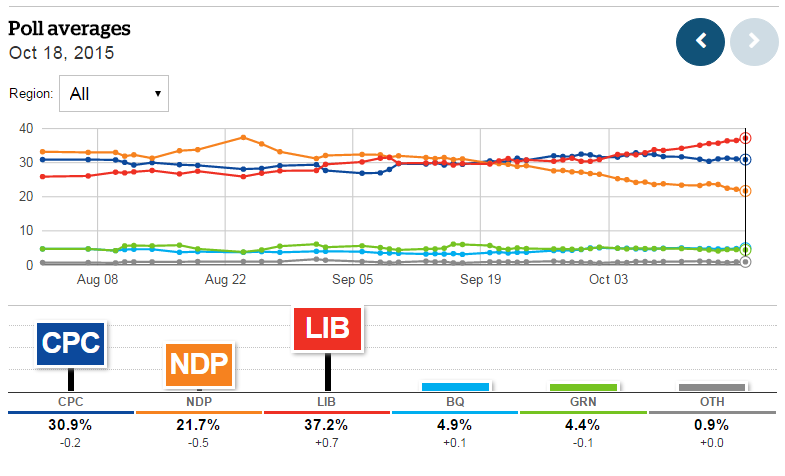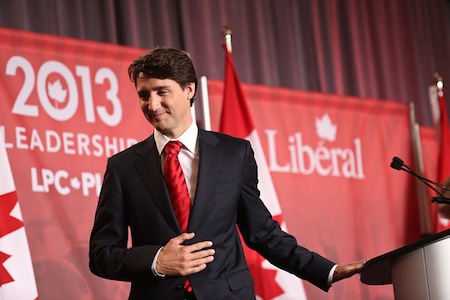
Roughly speaking, there are three plausible outcomes from tonight’s Canadian federal election.![]()
The first, increasingly likely (with a final Globe and Mail poll giving the center-left Liberal Party a lead of 39.1% to just 30.5 for the Conservative Party), is an outright Liberal majority government. It’s a prospect that no one would have expected a few days ago and certainly not when the campaign began with Liberal leader Justin Trudeau stuck in third place. But as the Liberals have pulled support from the New Democratic Party (NDP) and possibly even from the Conservatives in the final days of the campaign, they just might make it to the 170 seats they’ll need to form a government without external support.
The second, increasingly unlikely, is a Conservative win. No one expects prime minister Stephen Harper to win a majority government again nor anything close to the 166 seats he won in the 2011 election (when the number of House of Commons seats was just 308 and not yet the expanded 388). Under this scenario, Harper would boast the largest bloc of MPs, even though an anti-Harper majority of NDP and Liberal legislators would be ready to bring down Harper’s shaky minority government on any given issue. Despite a growing Liberal lead, there’s some uncertainty about the actual result. That’s because Canada’s election is really 338 separate contests all determined on a first-past-the-post basis. In suburban Ontario, throughout British Columbia and in much of Québec, where the NDP is most competitive, left-leaning voters could split between the NDP and the Liberals, giving the Conservatives a path to victory with a much smaller plurality of the vote. (In the waning days of the campaign, several groups have tried to urge strategic voting to make sure the anti-Harper forces coalesce on a riding-by-riding basis).
The safest prediction is still a Liberal minority. For a party that currently holds just 34 seats in the House of Commons after former Liberal leader Michael Ignatieff’s 2011 disaster, a plausible increase of 100 seats would be a massive improvement, validating the Liberals’ decision to coronate Trudeau as the party’s last saving grace. Despite the NDP’s loss of support, it is still expected to have some resiliency in British Columbia and Québec. Getting to 170 from 34 might just be a step too far, but it’s certainly no failure if Trudeau falls short in just one election cycle.
What seems clear from the trajectory of Canada’s 42nd election campaign is that Canada’s two parties of the center-left easily attract in aggregate over 50% of the vote in national polling surveys. Together, their lead over the Conservatives isn’t even close. Over the past month, as the Liberals have gained support, it’s chiefly come at the expense of the NDP, which was winning many more of those centrist and left-leaning voters at the beginning of the campaign:
As the Liberals gained, the NDP correspondingly lost support, indicating that the fluidity in the election has come from anti-Harper voters shopping for the most attractive alternative. Continue reading Why a Liberal-NDP coalition in Canada feels inevitable


